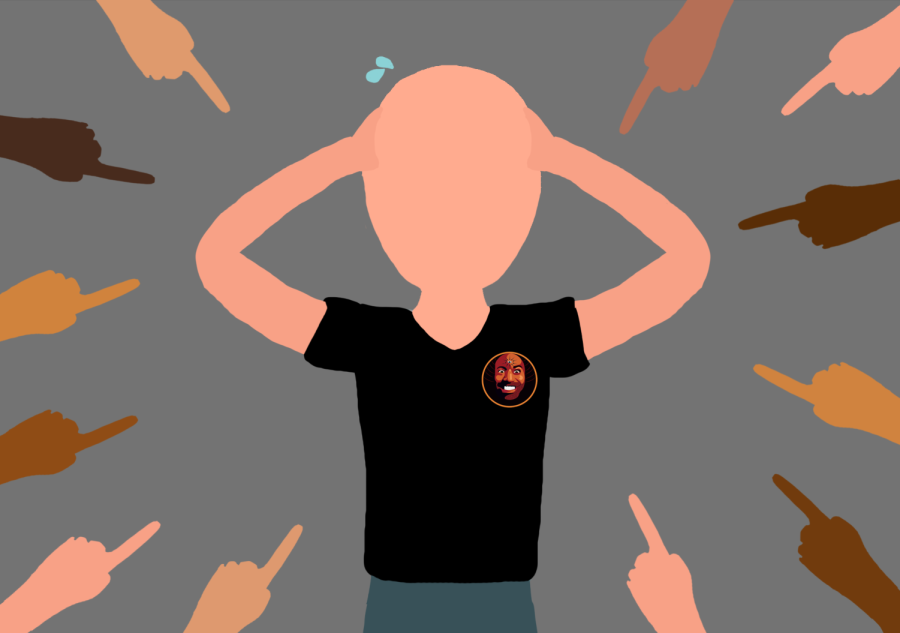Point/Counterpoint: The roots of outrage culture
February 22, 2022
If you’ve paid attention to pop culture lately, you’ve probably noticed a trend of outrage occurring over uncomfortable things being uncovered about celebrities, like the Joe Rogan controversy or the Awkwafina “blaccent” situation. But if you take a step back and look at things from an objective point of view, you start to question whether people are actually angry at the actions of said celebrities or if they’re just trying to find a reason to be upset at the world. My aim is not to determine for you whether or not people like Joe Rogan are good or evil, or to tell you that the way Awkwafina talks is exploitative of the Black community or not. My concern is with the rise of outrage culture just being a side effect of a more significant societal issue that we’re sweeping under the rug.
First, it’s important to give context to the events we’re discussing so we’re on the same page. To be perfectly transparent, I’ve been a big listener of “The Joe Rogan Experience” for half a decade now. I had actually seen several of the episodes the outrage is targeted towards when they first premiered. For those who are unfamiliar, Rogan — who is a sports commentator and comedian — has come under fire for things he’s said in the past. As a central figure in the podcasting world, the current controversy is over his previous use of the N-word, but he’s also been in hot water over his views on transgender athletes and gun control. If you’re a fan of Rogan or have listened to more than a couple of episodes, you would know that Rogan is, in fact, not racist. Many might laugh at the “I have black friends” defense, but I think it is a testament to his character when it comes to the podcaster. After a compilation video of Joe Rogan’s use of the N-word came out, many of his black friends came to his defense, including comedians Donnell Rawlings, Dave Chappelle and ex-Navy Seal, David Goggins — all testifying to his character. It’s also pretty clear that the attacks on Rogan have been coming for a while from the mainstream media who want to make a character assasination stick.
Rogan’s podcast gets 11 million average listeners per episode. That is more than the next four biggest shows on primetime television combined, according to Nielson ratings. He has so much influence that he makes other media outlets seem irrelevant. Comedian Andrew Schulz predicted years ago on his first appearance on the podcast that when Rogan became too popular to control, the media would fight back by making him “radioactive.” The first evidence of this is back when CNN claimed Rogan was taking horse dewormer to treat his COVID-19 symptoms and edited his Instagram video to make it seem like he was sickly. After the N-word controversy, Schulz predicted that when the controversy lost steam, they would just try and make him “radioactive” by painting him as an opponent of the transgender community. I guess only time will tell if Schulz is correct.
If you’re wondering how I could claim that Rogan is not racist or that he doesn’t hate transgender people, it would just take some more than surface-level digging. For one, in the episodes where Rogan uses the N-word, he’s using it in the context of either a quote or in an argument over whether the use of the word is okay. This was during a period a few years ago where the word’s use was on the discussion table because of controversies involving big names, like famous gaming youtuber, Pewdiepie. These were not actions of hatred. And in the transgender conversation, Rogan has always said that he doesn’t have an issue with transgender people, only their involvement in physical sports and has had trans guests on his show like Eddie Izzard and Blaire White and he uses their chosen pronouns. This doesn’t mean that Rogan is free from criticism, just that he’s being mischaracterized.
Rogan is being painted as something that he’s not. If you know him at all, he’s a leftist stoner who regularly talks about social reform and has endorsed Democratic candidates like Bernie Sanders for his economic policies. But my issue is not over Rogan being made to look bad; it’s over the fact that people our age don’t do any digging and groundlessly choose to be angry.
The biggest example of this is with actress Awkwafina. She recently got tied up in controversy for her accent that was said to be derived from a “black accent.” She’s being accused of using her accent to capitalize off of the work of Black comedians. Any serious person would realize she has a Queens, New York accent because … she is from Queens. I point out this incident because it clearly shows that there is no moral standing for outraged people to stand on. They are just people who want to be angry. How can we justify getting mad at a woman for having a regional accent? And are we not being racist by insinuating that every Black person has to have a certain type of way that they speak? We have gotten to the point where we get outraged over non-issues and then make them seem worse than they are, and I want to know why.
This is an incredibly nuanced issue that could make up an entire subgenre of books (which it already has), but I want to throw out some questions to ponder.
Are we actually angered over things celebrities have done, or are we cherry picking things to get angry about? Why are we so angry? Is it because we have a moral mission we have to fight for, or is it a deeper issue within ourselves and we’re using outrage culture as a vehicle to release that anger? Would celebrity controversies upset us as much if we had a purpose in our lives separate from politics?
My two cents is that our generation lacks purpose — a lack of purpose that might be coming from a more secular society. We are making up for that need to be a part of a collective; outrage is not unique to one side of the political aisle. I believe that people aren’t really outraged by things going on, they only believe that they are because they can’t confront that part of themselves that doesn’t understand why they don’t feel satisfied.






